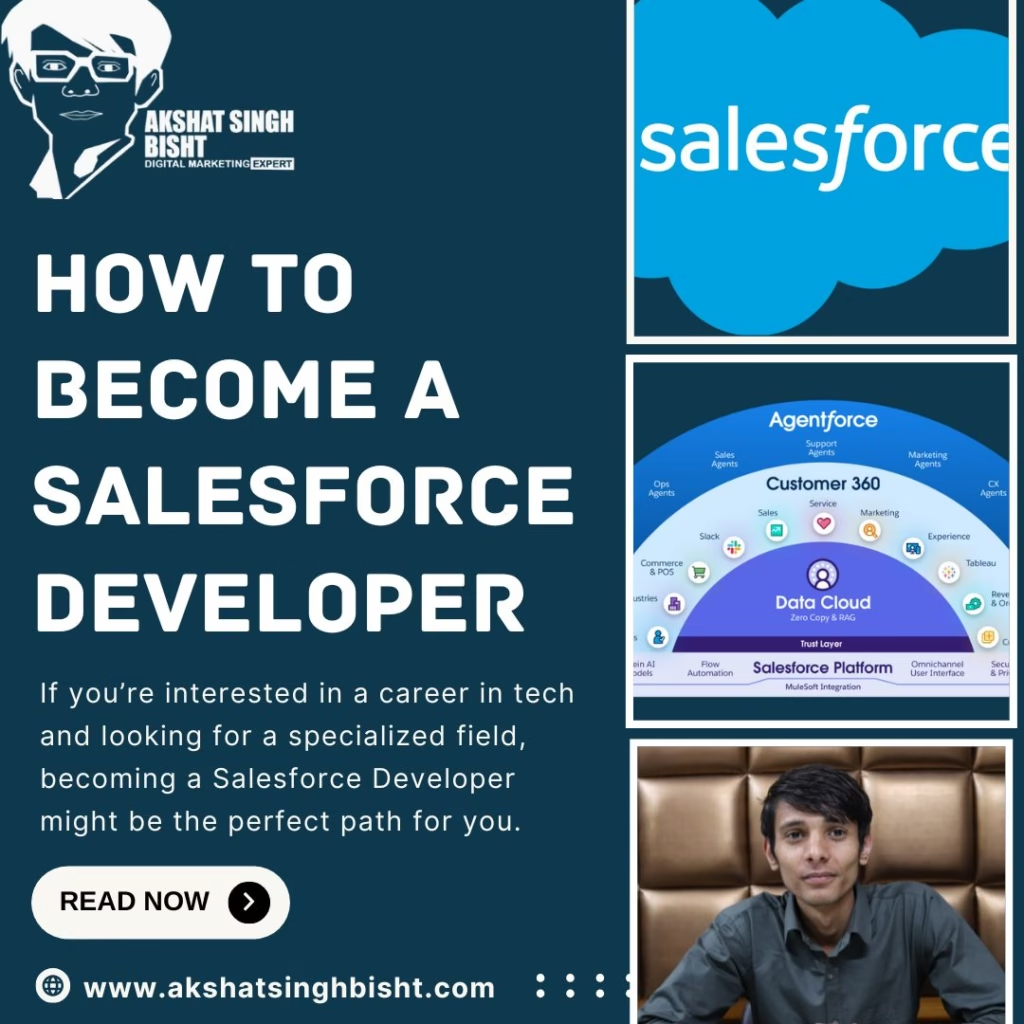Salesforce is one of the most popular and powerful Customer Relationship Management (CRM) platforms in the world. It helps businesses automate their processes, manage customer data, and drive growth. Behind its success is a talented group of Salesforce Developers, who customize and optimize the Salesforce environment to meet the unique needs of businesses. If you’re interested in a career in tech and looking for a specialized field, becoming a Salesforce Developer might be the perfect path for you.
In this blog, we’ll take you through the essential steps on how to become a Salesforce Developer, from understanding the basics to gaining hands-on experience and achieving certification.

A Salesforce Developer is a specialized role that involves creating custom applications, workflows, and integrations within the Salesforce platform. They work with Salesforce’s proprietary programming languages—Apex (for backend development) and Visualforce (for creating user interfaces)—to build solutions tailored to business requirements. In recent years, with the introduction of Lightning Web Components, the tools and technologies for development have evolved, allowing for even more powerful solutions.
Before diving into development, you need to understand the core of Salesforce as a platform. Start by familiarizing yourself with the basic components of Salesforce, such as:
Apex is Salesforce’s proprietary programming language, and mastering it is one of the most crucial steps to becoming a Salesforce Developer. Apex is used to write custom business logic and automation, extending the functionality of the Salesforce platform beyond out-of-the-box features.
To learn Apex:
While Apex handles the backend logic, Visualforce and Lightning Components are used for building custom user interfaces within Salesforce.
Visualforce: Visualforce is a framework that allows you to build custom pages by writing HTML, CSS, and Apex code. It gives you full control over the user interface and is widely used for creating custom page layouts in Salesforce.
Lightning Web Components (LWC): Lightning Web Components are a more modern way to build dynamic, reusable UI components using web standards like HTML, CSS, and JavaScript. Salesforce is shifting more toward using LWCs, so gaining expertise in this framework is essential for future-proofing your skills.
Before jumping into development, you need a solid understanding of how data is structured in Salesforce and how to configure the platform for various business needs.
The most effective way to learn Salesforce development is by gaining hands-on experience. Salesforce offers several resources for you to start building and experimenting:
Salesforce Trailhead: Salesforce Trailhead is a free learning platform with tutorials, modules, and projects that guide you through different aspects of the Salesforce platform. There are beginner to advanced courses on Apex, Visualforce, Lightning Web Components, and more. Completing modules here will give you the practical knowledge you need.
Salesforce Developer Org: Sign up for a free Salesforce Developer Organization (Dev Org) where you can practice writing Apex code, creating custom objects, and testing your skills.
Build Real-World Projects: Start by building small, custom applications and automations within Salesforce. This could involve creating a custom object for a business use case, developing an automation process, or building a custom page with Visualforce or Lightning Components.
Salesforce certifications are crucial for proving your skills and enhancing your credibility as a Salesforce Developer. The most common entry-level certification is the Salesforce Platform Developer I certification. This certification validates your knowledge of Salesforce’s core features, including Apex, Visualforce, and basic data modeling.
To prepare for this certification:
After earning the Platform Developer I certification, you can pursue the Salesforce Platform Developer II certification to deepen your expertise and showcase advanced skills.
Salesforce is constantly evolving, with new tools, features, and updates released regularly. As a Salesforce Developer, it’s essential to stay current with the latest developments in the ecosystem. Join Salesforce developer communities like the Salesforce Developer Community or participate in Salesforce-related forums and events, such as Dreamforce, the annual Salesforce conference.
Staying updated and networking with other Salesforce professionals can open doors to new job opportunities, collaborations, and learning resources.
Once you’ve acquired the necessary skills and certifications, it’s time to start applying for jobs as a Salesforce Developer. Many Salesforce Developers start in entry-level positions such as Salesforce Administrator or Junior Salesforce Developer, where they gain practical experience and move on to more complex development tasks.
You can find job opportunities for Salesforce Developers at:
Entry-level positions may require you to assist senior developers or work on smaller projects, but over time, you’ll gain experience and rise through the ranks.
Becoming a Salesforce Developer is a rewarding career path with plenty of opportunities in the ever-expanding world of CRM. By mastering Apex, Visualforce, Lightning Components, and Salesforce’s powerful suite of tools, you can craft customized solutions that help businesses improve their operations and customer relationships. With the right training, certification, and hands-on experience, you can position yourself as a sought-after expert in Salesforce development and enjoy a dynamic and thriving career in tech.
Akshat’s passion for marketing and dedication to helping others has been the driving force behind AkshatSinghBisht.com. Known for his insightful perspectives, practical advice, and unwavering commitment to his audience, Akshat is a trusted voice in the marketing community.
If you have any questions simply use the following contact details.